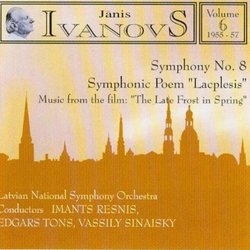| All Artists: Janis Ivanovs, Imants Resnis, Tons Edgars, Vassily Sinaisky, Latvian National Symphony Orchestra Title: Janis Ivanovs: Orchestral Works, Vol. 6 Members Wishing: 0 Total Copies: 0 Label: Campion Cameo Original Release Date: 1/1/1955 Re-Release Date: 1/29/2002 Genres: Soundtracks, Classical Styles: Historical Periods, Modern, 20th, & 21st Century, Symphonies Number of Discs: 1 SwapaCD Credits: 1 UPC: 739574201222 |
Search - Janis Ivanovs, Imants Resnis, Tons Edgars :: Janis Ivanovs: Orchestral Works, Vol. 6
 | Janis Ivanovs, Imants Resnis, Tons Edgars Janis Ivanovs: Orchestral Works, Vol. 6 Genres: Soundtracks, Classical
|
Larger Image |
CD Details |
CD ReviewsIvanov's deep emotional agitated works. David A. Hollingsworth | Washington, DC USA | 03/02/2002 (4 out of 5 stars) "The fact that Janis Ivanovs continues to be deemed as the most important modern Latvian composer is hardly at all surprising; he had this uncanny ability to convey depth and substance in his music aided by a rather impeccable scoring. The gift for imaginative thought and evoking orchestration makes his music not only accessible, but very appealing. Like Myaskovsky, Ivanovs' at his best in slow movements. He has a certain psychological sound world that places him apart from even his nearest contemporaries. His later works are generally more successful than his earlier ones (his writing is a bit more focused and idiomatic). However, the weakness lies in his tendency to not travel far enough in forming his musical ideas. He tend to rely rather on redundancy more so than on development. But, he definitely had an ear for the orchestra, as the suite from the film "The Late Frost in Spring" (1955) belies. The suite is actually a gorgeous piece, full of noble and vivid ideas that Sibelius would appreciate...somewhat. He've used much of the materials from Second Symphony written roughly two decades earlier (according to sources, it was deemed lost by that time and was discovered in 1985). Though the discursive suite is beautifully written, the "Matisins" movement is one which I find myself drawn back to, for it's marginally more enterprising than the suite as a whole. Perhaps we will be better off with the complete film version. The Eighth Symphony and Lacplesis are much more impressive. The Symphony, written during the same time as the film music, is of a stronger profile. It evokes at places the philosophical, dramatic, and in the Andante movement, the melancholic sound world of Myaskovsky without being derivative. The first movement have subjects sharply contrasted between the warmth and the drama (a bit Myaskovskian in manner). The ideas are fresh and engaging and while the work is not quite a masterpiece, its thematic invention is admirably held together. This is true of the Andante, third movement, where its melancholy is quite memorable. Its mood is that of a northern landscape that even Grieg and perhaps Tubin can relate to. Lacplesis is likewise a stronger work, not as impressionistic as his earlier symphonic poem "Rainbow", but epic and dramatic in the vein a bit similar to Sibelius. The performances are generally ideal to the demands of the works, with Edgars Tons having the Symphony in full measure. The recordings are tolerable if hardly distinguished. Nevertheless, it's an essential disc, notwithstanding the gorgeous, yet relatively flat, uninspiring, suite."
|

 Track Listings (14) - Disc #1
Track Listings (14) - Disc #1